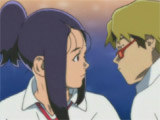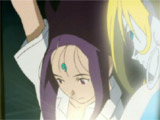

Quick Links:
Earth Girl Arjuna (Chikyuu Shoujo Arjuna)
Chikyuu Shoujo Arjuna, or Earth Maiden Arjuna, cannot easily be defined within the space of a small opinionated review and surely provides plenty of matter for a dissertation-sized article on its varied topics, musings, and story. I shall try to disrespect it as little as possible by placing it within classification with my words, but I am afraid that I cannot offer a neat, succinct description, nor much in the way of a impassionate assessment of it. The most concise I can be is to say that Arjuna has become one of my favorite anime series.
The death of the main character is normally reserved for the end of a show, but Arjuna begins with this very thing. While riding on her boyfriend Tokio's motorcycle along a mountain road, Juna Ariyoshi is pulled from the bike by an unknown force and dies. While transitioning between this life and the next, Juna envisions the destruction and death of life on the planet. A being appears before her and tells the dazed girl that she is the one who can prevent the grisly images she has witnessed, and that should she be willing to combat the forces - the Raaja - that will cause this travesty, her life will be restored. Juna agrees out of desperation and begins her role as the Avatar of Time.
Leaping out of the hospital bed, she emerges from the building and leaps onto a helicopter, where the person who saved her life, Chris, bestows on her the Drop of Time. The stone allows her to 'sympathize' with the planet and draw on its energies. Barely awakened to her position, and without specific explanation of her power or purpose, Juna is dropped from the chopper at a nuclear power plant that shortly falls under assault from one of the Raaja, ethereal worm-like beings that appear to be created as reactions to the degradation of the environment. Tokio, having followed on his motorcycle, is thrown from it by collapsing debris, prompting Juna to rouse her new abilities to save him and confront the Raaja in battle.
The first episode, described above, leaps into the fantastic themes headfirst and then scales back to develop the characters, world, and themes of the show. Though involving some very sci-fi elements, with a dose of the mystical, the show is not defined by either. Along with the deeply personal take on it, environmentalism is the prime aspect that characterizes what Arjuna is all about. And yes, it is one of "those types of shows" that can be overly idealistic of its views - sometimes unrealistically so with its other-worldly aspects and the way these ideas manifest themselves in the storyline - but it is less forceful than most pieces of media that take on these issues, and almost perfunctory to the exploration and exposition of an assortment of other ideas.
Chief among these themes appears to be a call for a reversion to hunter-gatherer ways, forsaking current forms of agriculture and industrialization that are indisputably detrimental to the health of the planet. An entirely plausible method by which man could live, and thrive to a degree, is shown early on in the purely natural garden/farm of the old man Juna and Tokio come across in episode four. However, while director Shoji Kawamori (the widely respected creator of Escaflowne and Macross) rightly poses that people would not be willing to give up the luxuries and conveniences of modern society to essentially regress to earlier systems of social order, he seems to also imply that not abandoning progress as it is will inextricably lead to the destruction of the planet. As slow conversion to former ways is not an option, catastrophe is the only way to force the issue. And counter to what is seen in the show, this would doubtlessly entail an extreme loss of life and possibly be perilous to the survival of the species. It may simply be how the story was meant to unfold, but all of the characters in the show hold an adversarial view of man and nature, the coexistence of natural habitats and the further progress of society not examined in the least. My point is, the show is to be taken with a degree of consideration on the part of the viewer, as these are the personal views of some of the creators, Kawamori in particular. Regardless, the fact it should cause one to consider these topics is an achievement in and of itself.
A few other concepts are touched on, albeit rather imprecisely unless directly addressed, which is to be expected in this format. (Most were addressed with more objectivity and good sense than environmental issues mentioned above, I should note.) The more intricate of these include: the extreme limitations that language, and words themselves, place upon humans in communication (despite being our primary means of communication); the extreme sacrifices a person takes upon oneself for the 'greater good'; the sheer amount of wasteful products - 'supplies', and food generated by society not only counter to need, but in excess of want. While I was intellectually aware of these things, and cautious of them to a degree, the show has caused me to be more actively conscious of them and exercise care when dealing with them.
Regardless of my views on the concepts covered in Arjuna, the storytelling enhanced by them is unquestionably wonderful. The largely desensitized topic of ecology is given a fresh look through the eyes of Juna and the other characters. Relationships are a strong secondary narrative theme, not only seen romantically through Juna and Tokio's difficulties as a couple, but familial and social ties as well. This half of the show is more compelling than the main storyline, in my opinion, and never becomes excessively soap-opera-like, as happens all too often when this is coupled with a separate main plot.
I do hold a single, specific, and rather large qualm with the storytelling, though. Chris, a would-be mentor on protecting life to Juna, continually rails on her, slinging accusations of being ignorant and a fool, without even attempting to explain things to her, and consequently the audience. It is ridiculous to expect this young girl - with zero experience with these matters - to know how to deal with the Raaja, her powers, and so on, especially with Chris criticizing her at every turn, telling her that the way she tries to deal with them is wrong and without offering an alternative way. There is a logical explanation given at the end of the show for why he does not want her to harm the Raaja's (and a slightly illogical reason for how she can deal with the Raaja seen elsewhere), but Arjuna is the furthest thing from a type of show that benefits from this. This series is not a dark mystery or horror - or, frankly, even that cerebral of a show - where things should be kept hidden and revealed unexpectedly at the end (which can be seen coming a mile away in Arjuna), so this reason should have been developed more naturally.
Many have hailed the visuals in Arjuna to be a feat of animation and computer graphics, though I am less astounded than most. By and large, it is most definitely animated quite beautifully, with some moments of supremely gorgeous sequences. However, the animation is far from fluid and the use of CG is less than seamless. I have never been a fan of using CG in conjunction with or imbedded into animation, as it almost always looks unnatural. While Arjuna does a better of job of it than most, it is still irks me whenever I see it in a piece of the scene and it sticks out like a sore thumb. (This is compounded by the small slowdown stutter seen on the computer graphics throughout the show.) When it comes to 'camera' angles and techniques, as well as the small accents applied throughout the show, the show benefits marvelously from the use of CG, as seen in Juna's panic attack in the Meriken Burger, the panoramic tour through the old man's fields, or Tokio speeding down a road on his bike. The use of quick live-action clips interspersed in certain scenes, while not revolutionary, can act to add a certain degree of believability to the remarkable events that occur and is a very nice touch. The series is indeed quite lovely, but do not expect the constant marvel some would have you believe.
Arjuna excels just as much aurally as it does in storyline and visuals. I would direct you here and here for my opinions on on the music itself, but in brief, the show is accompanied by a soundtrack that is nothing less than stellar. Arjuna takes full advantage of the score crafted by Yoko Kanno, of Cowboy Bebop and Escaflowne fame, which is varied, not overly forceful, and simply a joy to listen to. I'd heartily recommend checking out the soundtracks. As to the voice acting, the Japanese is easily among the most involving and wholly believable I have heard. While I have not listened to the English track through the entire show, what I have heard is above average as far as dubbing goes, but still lacking compared to the original.
As for Bandai's treatment of the show, I'm mostly pleased, though not without grievance. The DVD release is splendid, with crisp visuals, excellent sound options, and a goodly amount of extras. The audio tracks include both 2.0 and 5.1 Dolby for Japanese and English, as well as an isolated score. The extras are fairly diverse, including, but not limited to: 'dictionaries' of terms and concepts, several interviews with Kawamori and other production staff members, a karaoke video of the ending theme, and the requisite trailers (which are varied a reasonable amount from disc to disc). My biggest problem with the release is something I would not have expected to have problems with - the music in the DVD menus is simply set too loud in comparison to, well, everything else on the disc. Not that I do not love the music, as stated, but I do not need my ears blasted out every time I start up the disc, nor should I have to adjust the volume continually. Other than this, which really should not have been overlooked, Arjuna was done as much justice on disc as is possible.
Arjuna is comprised of so many magnificent pieces used well, (mostly) in harmony with each other, that it becomes much more than the sum of its parts and generally overcomes its shortcomings. The end result is, in my humble opinion, the one show that the phrase 'required viewing' should be applied to above nearly all others, even if it is not perfection or a definitive piece of animation.
Plot: B+ Character Design: A Animation Quality: A- Music: A+ Overall: A
Distributor: Bandai Creator: Shoji Kawamori / Satelight Released: 2002 - 2003



